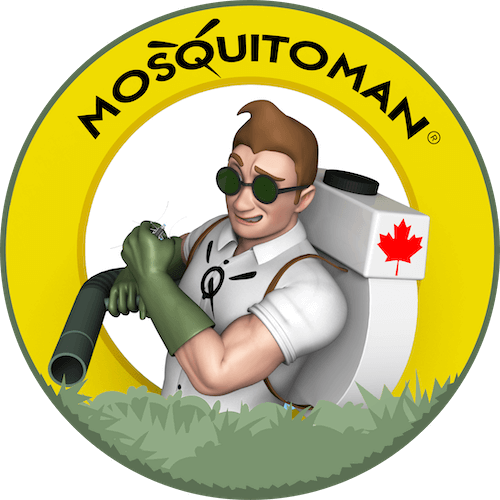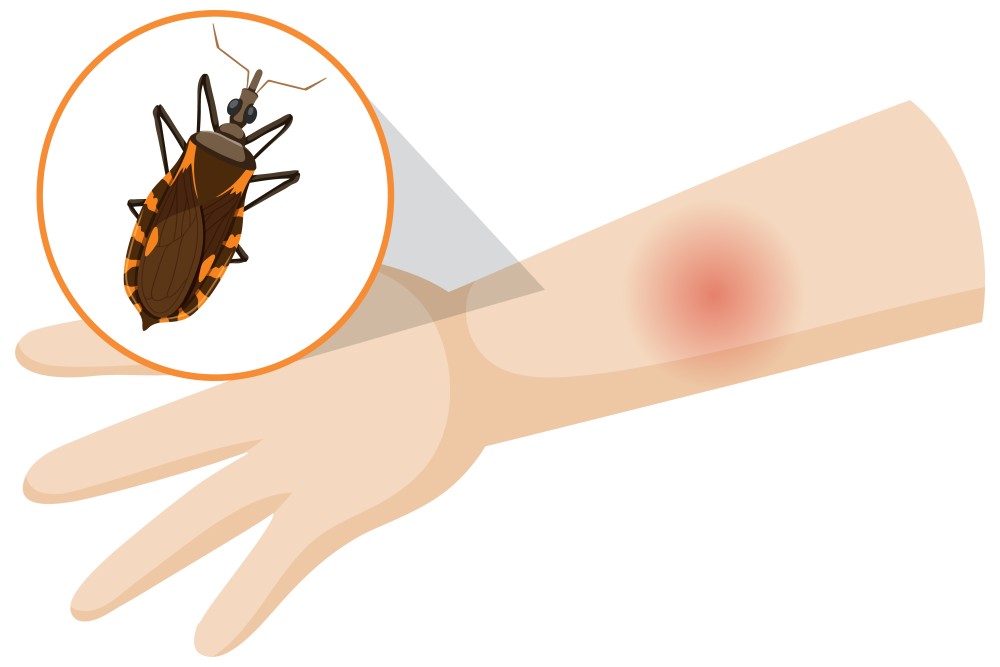Learn to identify and prevent tick bites effectively with tips from Mosquito Man, and ensure your family’s health by recognizing symptoms and seeking timely treatment for tick-borne diseases. Learn about our tick control services in Canada.
What Are Tick Bites?
How do tick bites occur?
Tick bites happen when ticks attach to your skin to get a blood meal. Ticks use their mouths to pierce the skin, and they might stay attached for hours or days. While feeding on your blood, they grow and prepare for laying eggs. To avoid tick bites, try to stay out of areas with a lot of ticks, like grassy or wooded places.
What are the common signs of a tick bite?
When a tick bites you, it often leaves marks on your skin. You might see a small red bump, redness, or a rash around where it bit you. Itching or irritation can also happen, and you might notice a tick mark showing where it was. Check your skin carefully after being outside to catch these signs early.
Learn more: What to Do After a Tick Bite
Can tick bites be dangerous?
Yes, tick bites can be dangerous because they might carry diseases. These bites can spread illnesses such as Lyme disease and Rocky Mountain spotted fever. Ticks can pass on bad germs that cause infections, so it’s important to wear protective clothing and use tick repellents to stay safe.
Recognizing Symptoms Related to Tick Bites
What symptoms indicate a severe reaction to a tick bite?
If you have a bad reaction to a tick bite, watch out for certain symptoms. Some signs include a big rash, a rash that looks like a bullseye (common in Lyme disease), joint pain, fever, and swelling where the tick bit you. If these symptoms appear, go to a doctor fast.
How soon do symptoms appear after a tick bite?
Symptoms after a tick bite don’t always show up right away. Early signs of illness might start a few days to a few weeks later. The time it takes depends on the disease the tick gives you. Look for things like fever or rash soon after a bite so you can get treatment quickly if needed.
When should you consult a healthcare provider for tick bites?
You should see a doctor if you keep having symptoms or they get worse after a tick bite. If you have a big rash, fever, or other strange symptoms, getting medical help is smart. A doctor can check for infections and prevent bigger problems.
Preventative Measures for Tick Bites
How can you protect yourself from ticks?
When you go outside, it’s important to stop ticks from biting you. Avoid areas with thick plants and tall grass where ticks live. Use insect repellents that work against ticks. Products with DEET or permethrin can be put on clothes and skin to help. Stay on clear paths to keep away from tick habitats.
What clothing is effective in preventing tick bites?
Wearing the right clothes helps stop tick bites. Long-sleeved shirts and pants cover your skin. Tuck pant legs into socks or boots to block ticks. Light-colored clothes make it easy to see ticks before they attach.
Should you use insect repellent to prevent tick bites?
Yes, using insect repellent helps prevent tick bites. Pick products made for outdoor tick protection. Repellents with DEET or permethrin are good for tick prevention. Always follow the label instructions to use them safely and correctly.
Effective Tick Bite Treatment Options
How should you properly remove a tick?
If a tick bites you, take it off right away. Use fine-tipped tweezers to grab it close to the skin. Pull up slowly and firmly. Don’t twist or jerk, or the tick’s mouth might stay in your skin. Removing ticks correctly is an important part of tick bite first aid.
What steps should you take after removing a tick?
After removing a tick, wash the area with soap and water. This helps stop infection. You can also use an antiseptic. Watch for signs of infection, like redness or swelling. Talk to a healthcare provider if you feel very sick or worry about Lyme disease or other tick illnesses.
Are there any over-the-counter treatments for tick bites?
Yes, you can buy treatments for tick bites at the store. Topical antihistamines can help stop itching. For pain, you can use pain medicines like ibuprofen or acetaminophen. These treatments work well for mild discomfort after a tick bite.
Understanding Tick-Borne Diseases
What diseases can result from tick bites?
Tick bites can give you diseases called tick-borne diseases. One common disease is Lyme disease, which comes from bacteria and causes health problems if not treated quickly. Other diseases like anaplasmosis and ehrlichiosis also come from bacterial infections through tick bites. Knowing how ticks spread diseases helps us protect our health.
How prevalent is Lyme disease in the United States?
Lyme disease happens a lot in some parts of the United States, especially in the Northeast and upper Midwest. These areas have environments where ticks can live easily, making tick bites and symptoms more common. Knowing where ticks are found helps us prevent tick bite symptoms and Lyme disease.
Can tick bites cause allergic reactions?
Yes, tick bites can cause allergic reactions. Some people have redness, itching, or swelling where they got bitten because of stuff in tick saliva. Tick bite allergies can be mild or need a doctor’s help. Watching for tick bite symptoms is important, and seeing a health care provider if needed is wise.
Tick Bite Reactions in Children and Pets
How do tick bites affect children differently than adults?
Tick bites might show up differently in children than in adults. Kids’ skin can react more to tick bites, making them itch or irritate more. It’s smart to watch tick bites on children closely and talk to a health care provider if any worrying symptoms appear.
What precautions should be taken for pets regarding tick bites?
To keep pets safe from tick bites, try these steps:
- Check for ticks often: Look over your pets, mainly after they’ve been outside.
- Use tick prevention products: Ask your vet about tick control methods like collars, sprays, or pills.
- Keep your yard tidy: Cut grass short and clear away leaf piles to make fewer tick-friendly spaces.
These actions can help stop tick bites on dogs and other pets, keeping them healthy.
How can you identify ticks on your pet?
Finding ticks on your pet means looking for tiny, dark spots that move slowly in their fur. Using tools for tick identification can help in spotting a tick. Be sure to use proper tick removal techniques if you find one, ensuring it’s completely gone to lower tick infestation risks.
Seasonal Impact on Tick Populations
Tick populations change a lot with the seasons in the United States. Knowing how environmental conditions affect tick activity is important for everyone who spends time outdoors.
When is tick season in the United States?
In the United States, tick season is usually in spring, summer, and fall. Ticks are most active from April to September. But in some southern areas, warmer winters can make ticks active at other times of the year too.
Do ticks thrive in specific environmental conditions?
Ticks do well in certain places. They like humidity and warm temperatures. Wooded areas and grasslands with lots of moisture are perfect for them. These environmental conditions help ticks find hosts more easily.
Can seasonal changes increase tick activity?
Yes, seasonal changes can make ticks more active. When temperatures go up in spring and summer, ticks spread out more. More rain and temperature changes help ticks grow and find food, which makes their numbers go up.
Potential Complications from Tick Bites
Tick bites can cause serious problems if not treated. It’s important to know the risks of tick-borne diseases and get medical help quickly.
What complications can arise from untreated tick bites?
If tick bites are not treated, they can lead to problems, like infections. This might cause chronic diseases, neurological issues, and joint pain. Early treatment can stop serious health issues.
Are tick bite infections common?
Tick bite infections happen often. Bacteria can spread in many cases. Early signs include redness or swelling where the bite is. Most infections can be treated with antibiotics if found early.
What are the signs of a tick-borne illness?
Signs of a tick-borne illness include fever, rash, tiredness, and muscle aches. Finding it early and getting treated is important to stop it from getting worse. If you see these signs after a tick bite, talk to a healthcare professional right away.
Staying informed about tick seasons and preventing tick bites can help you enjoy being outside without worry.
Myths and Facts about Tick Bites
Tick bites can be scary because many myths are out there. Knowing the truth about ticks and if they spread diseases is important to stay safe.
Are all ticks carriers of disease?
Not all ticks carry diseases. While some ticks can spread illnesses, many do not. Different types of ticks carry different diseases. For example, deer ticks are known to spread Lyme disease, but other kinds of ticks might not carry any disease. It’s good to know which types of ticks are in your area and if they are carriers of tick-borne illnesses.
Does every tick bite lead to an infection?
Not every tick bite causes an infection. Most tick bites are harmless. But it’s smart to watch a tick bite for signs of infection. If you see redness, swelling, or a rash around the bite, talk to a doctor. To stop infection, take the tick off quickly and clean the bite area well.
Can you contract multiple illnesses from a single tick bite?
Yes, you can get more than one illness from a single tick bite. Some ticks can carry different bacteria or viruses at the same time. This means a tick could give you Lyme disease and another sickness together. It’s important to know the symptoms of tick diseases and get help if needed.
Advanced Strategies for Tick Control
To control ticks well, use a mix of personal protection and community actions. Here’s how public health and services help in reducing tick numbers.
How can environments be managed to reduce tick populations?
Managing the environment to cut down on ticks involves several steps. Changing habitats is key. Keep grass short, remove piles of leaves, and put up barriers between woods and play areas. These changes make the area less attractive to ticks and the animals that bring them.
What professional services are available for tick extermination?
There are professional services that can help with tick extermination. Pest control experts have special ways to remove ticks and manage their numbers. These services might use chemicals and suggest landscaping ideas to keep ticks away.
What role does public health play in tick prevention?
Public health is important in stopping tick problems by providing information and resources. Public health programs often teach people about tick-borne diseases and give tips to avoid them. By sharing health information and raising awareness, these efforts help people protect themselves from tick bites and diseases.
By knowing the facts about ticks and using smart control methods, you can lower the risk of tick bites and diseases. Stay informed and ready for a safe time outdoors.
Frequently Asked Questions: FAQs About Tick Bites
What should I do if I’ve been bitten by a tick?
If a tick bites you, clean the area with soap and water right away. Watch for rash or fever over the next few days. If you feel sick, talk to a healthcare provider.
How can I recognize the symptoms of tick-borne illnesses?
Tick-borne illness symptoms often include fever, rash, and feeling very tired. If you notice these after being in grassy or wooded areas, see a healthcare provider.
When should I seek emergency care for a tick bite?
Get emergency help if you have a bad headache, trouble breathing, or your heart beats funny after a tick bite. These might be signs of something serious.
Are there any effective tick control methods for my yard?
Yes, keeping your lawn short, removing piles of leaves, and using bug spray on your skin can help. Check public health resources for more tips.
Can antibiotics help after a tick bite?
Doctors sometimes give antibiotics to stop Lyme disease, but only if certain things happen. Ask your healthcare provider if you need them.
How can I prevent tick bites during outdoor activities?
Wear long sleeves, tuck your pants into your socks, and use bug spray. Always check for ticks after being in places where they live.
What should I do if my pet is bitten by a tick?
Take the tick off right away and ask your vet what to do next. Watch for signs like tiredness or not wanting to eat in your pets.
How can tick bites lead to allergies?
Some people can become allergic to red meat after tick bites from certain types of ticks. This needs a doctor’s care to handle it right.
Tick Bites – Key Insights
- Understanding tick bites means knowing about different types of ticks: blacklegged ticks, lone star ticks, and dog ticks. They can carry germs that make people sick.
- Preventing ticks is important in areas like New York, Vermont, and Colorado. These places have many ticks, especially in forests.
- If a tick bites you, look out for signs like fever, swelling, or red skin. These could mean you’re getting sick from the bite.
- To avoid ticks, wear long clothing, use bug spray, and check for ticks after playing outside, especially in tick-filled areas.
- If you feel sick after a tick bite, go to your doctor. They can check if you have something like Lyme disease or Colorado tick fever.
- Research by the Wisconsin Department of Health Services shows why stopping tick bites and controlling tick numbers is important.
- You can help stop tick bites by being careful outside and brushing off ticks right away to stop the spread of germs.
- For tick bites, clean with soap and water, put ice on it to stop swelling, and watch for bad symptoms for a few days.
- Our helpful guide talks about tick life stages and how to deal with tick bite allergies.
- Stay updated on tick-related topics by using safe websites and listening to health advice so you can have fun outside safely.





